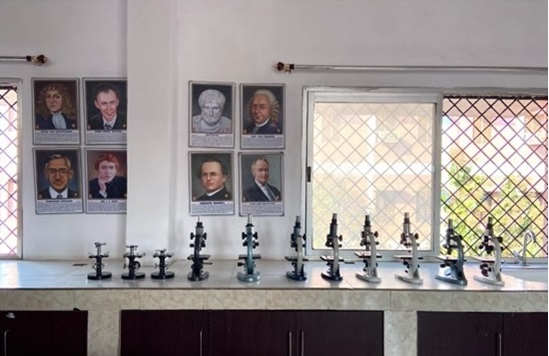- ICT Cell
- Criteria Wise Convenor
- Internal Compliant
Committee - Women Cell
- Anti Ragging Committee
- Anti Sexual
Harashment Committee - Alumni Association
Members - Student Grievance
Redressal - Purchase Committee
- Library Committee
- Training & Placement
- Student Welfare officer
- Research Committee
- Cultural Committee
- Discipline Committee
- Press &
Media Committee - Sports Committee
- Tour & Picnic Committee
- NSS Committee
- ICT Cell
- Criteria Wise Convenor
- Internal Compliant
Committee - Women Cell
- Anti Ragging Committee
- Anti Sexual
Harashment Committee - Alumni Association
Members - Student Grievance
Redressal - Purchase Committee
- Library Committee
- Training & Placement
- Student Welfare officer
- Research Committee
- Cultural Committee
- Discipline Committee
- Press &
Media Committee - Sports Committee
- Tour & Picnic Committee
- NSS Committee
Botany Department
The department of botany, affiliated to Gulbarga university was established in the year 2007. It was introduced as an optional subject in B.Sc in combination with zoology and chemistry. The department started with an admission of only 10 students and today it stands tall with a strength of 70 students. The department has a dedicated staff who are keen on providing quality education and in-depth knowledge to the students so that they can face any kind of challenges in future. The department is well equipped with all the necessary facilities like charts, museum specimen, slides, models, herbaria and other necessary instruments. We have achieved increasingly good results every year by and remedial classes and academic guidance for slow learners. Botanical tour are organized to gain knowledge about plant diversity, different ecosystems and habitats of various flora.
Aims and Objectives:
1.To produce a greener India by creating awareness regarding conservation and tree plantation.
2.To provide academic excellence for better understanding of the subject to build up students confidence for competitive exams and higher studies.
3.To provide the students with basic taxonomic knowledge and skills for preparing herbaria.
4.To equip the students for self employment through skill based education.
5.To develop proficiency in certain laboratory skills.
Vision
To be recognized as a premier department providing quality education and laboratory skills in the field of Botany and to contribute significantly to the society and the nation as a whole.
Mission
M1:To provide a wide spectrum and in depth of knowledge about the subject with a view of creating proficient, professionally competent & socially responsible graduates.
M2:To develop an aptitude for science and research.
M3:To introduce students for modern ideas and thoughts for sustaining in the global world.
M4:To establish links with national and international institutes for the better improvement and upliftment of students and the department as a whole.
.
Program Outcomes
PO1: Critical Thinking: Apply the knowledge of botany in scientific thinking and research.
PO2: Effective communication: Successful transfer of scientific knowledge both orally and in writing, designing documentations, make effective presentations and give and receive clear information.
PO3: Social interaction: Function as an individual or as a leader to perform a task in classroom or in a study tour or in college activities & functions.
PO4: Scientific knowledge: Use the knowledge of basic science and fundamental processes to study and analyse plant forms.
PO5: Practical skills: Giving opportunities to students to perform experiments practically both in the field and laboratory, to gain proficiency and skills in different topics.
PO6: Environment and sustainability: Understand the role of plants in environmental issues and learn the significance of conserving a clean environment for sustainable development.
PO7: Self directed life-long learning: Recognize the need for lifelong learning to cope up with the growing competition for higher studies, employment and technological change.
HOD Desk

Dr. Shyamala
Principal and H.O.D
I, Dr. Shyamala welcome you to our department of botany where we have a team of well experienced, highly qualified and enthusiastic staff who are always ready to full fill the needs of students. We provide a platform for the students where they can come up with new ideas and exhibit their skills, which increases their self-confidence and stage courage by the way of seminars, group discussions and debates.



